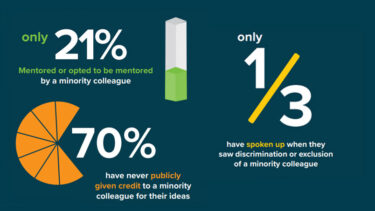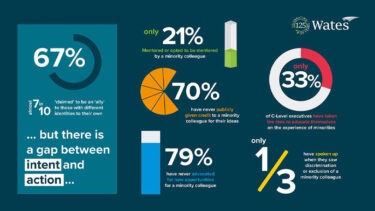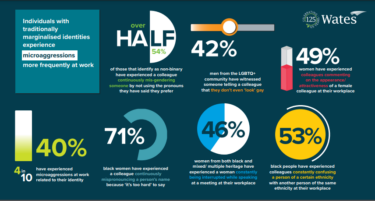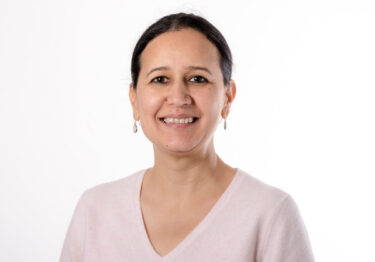Two thirds admit
to not speaking
up when seeing discrimination at work



SURVEY WITH OVER 5,000 EMPLOYEES
The survey of over 5,000 employees is one of the first studies into allyship in the UK workplace and reveals that, while most think they are supportive of colleagues from underrepresented groups, intent is still not translating into action when it comes to tackling discrimination.
Only one third (37%) of respondents had taken the time to educate themselves on the experience of minorities, falling to 33% among C-level executives. At the same time, 70% admitted they had never publicly given credit for ideas to a minority colleague and 79% had never advocated for new opportunities for those in a minority group.
It is releasing the research as it launches a new campaign to mark National Inclusion Week, aimed at breaking down the barriers to allyship and preventing microaggressions in the workplace. Holding its own annual Inclusion Month across September, it has asked all employees to make one allyship commitment and is now calling on the wider industry and business community to do the same.

40% EXPERIENCED MICROAGGRESSIONS AT WORK
The research found that four in 10 (40%) have experienced microaggressions at work related to their identity. This figure rises to almost six in 10 for gay, lesbian (58%) and bisexual (59%) employees and to 64% for individuals from Black Caribbean background. Three in five respondents from Black African (60%) or Caribbean (59%) backgrounds have seen colleagues mispronouncing a name because it is ‘too hard’ to say, while four in 10 (42%) men from the LGBTQ+ community have witnessed someone telling a colleague that they don’t even ‘look’ gay.
Almost half of those identifying as gay, lesbian (47%) and bisexual (46%) said they had seen instances of microaggressions and discrimination related to someone’s sexual orientation, dropping to 26% overall. Similarly, while 62% of people from a Black Caribbean and 47% from a Pakistani background had witnessed microaggressions or discrimination related to race or ethnicity, this was only 35% overall, further highlighting the need for increased education around the experiences of underrepresented groups.
Recognising that there is a long way to go to create an inclusive workplace, both within its business and the UK workforce more broadly, Wates has committed to creating an environment where all talent can thrive. This includes sharing data that helps both itself and organisations across all sectors to take meaningful action.
Earlier this year, it sponsored a landmark study by the Fawcett Society which exposed the damaging stigma around the needs of menopausal women, and in 2021 it became one of the first companies within the built environment to support flexible working. It has been recognised as a Times Top 50 Employer for Women; was winner of the Best for Families and Best for Fathers categories at the Working Families awards; as well as receiving the Diversity and Inclusion Excellence Award at the 2022 Construction News Awards.

Nikunj Upadhyay
Inclusion and Diversity Director at Wates